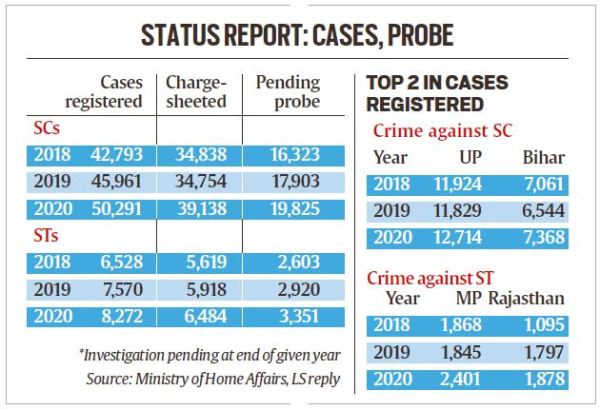
Source: Ministry of Home Affairs, Lok Sabha reply
By Muhammad Haris 12 February 2023
Crimes against Dalits and other Scheduled Castes (SCs) have been a persistent problem in India and have been increasing in recent years. They have been traditionally marginalized and oppressed in Indian society. Contrary to Indian claims of eradicating caste-based discrimination and violence, instances of crimes against Dalits and SCs continue to be reported in various parts of the country. These crimes range from physical violence, such as assault and murder, to economic exploitation and discrimination in access to education, employment, and healthcare. There have also been numerous reported cases of violence against Dalit women, including sexual violence, and discrimination in access to justice.
Caste-based discrimination has been deeply ingrained in Indian society for centuries, leading to widespread marginalization, exclusion, and violence against Dalits and other marginalized groups. This discrimination affects all aspects of life for Dalits, including access to education, housing, work, and political participation. Women and girls are particularly vulnerable, often facing sexual violence, trafficking, early and forced marriage, bonded labour, and other harmful cultural practices.
A recent video on social media showing a brutal attack on a Dalit girl in Uttar Pradesh has exposed the ongoing caste-based discrimination that still exists in India. The victim was attacked for bathing in a nearby water body, which was deemed impure for upper-class Hindus. This disturbing incident has shown that the ideology is not only flawed but is also promoting and perpetuating caste-based discrimination and violence in the country. Not only this, the assault on the Dalit girl is a symptom of a much larger problem, which is the persistence of caste-based discrimination in India. This long-standing issue has not been effectively addressed. It is a sad reminder of the continued marginalization and suppression of the Dalit community, which constitutes a large part of the Indian population.
According to the latest data released by the National Crime Records Bureau (NCRB), there has been a 1.2% increase in the number of cases of atrocities against SCs in 2021 compared to 2020. With 50,900 cases recorded in 2021, this translates to a staggering average of 140 crimes committed against SCs every day. The situation is particularly grim in certain states, with Uttar Pradesh reporting the highest number of cases of atrocities against SCs, accounting for 25.82% of the total cases. This is followed by Rajasthan with 14.7% (7524 cases), Madhya Pradesh with 14.1% (7214 cases), Bihar with 11.4% (5842 cases), and Odisha with 4.5% (2327 cases). These top five states alone reported 70.8% of all cases of atrocities against SCs in India. These figures are a staggering reminder of the discrimination, violence, and marginalization that Dalits continue to face in India.
Likewise, the state of Adivasis in India is alarming with an increase in reported crimes and atrocities committed against them. In 2021, 8,802 cases were reported, with the highest number in Madhya Pradesh, followed by Rajasthan, Odisha, Maharashtra, and Telangana. This highlights the need for attention to be given to the safety of Adivasis in India and for the government and civil society to work together to address the root causes of violence and bring perpetrators to justice. The increase in crimes against Adivasis is a reminder of the ongoing marginalization and discrimination faced by the community, and the need for sustained efforts to address these issues. The above statistics highlight the ongoing and persistent nature of caste-based violence against Dalits in India. The recent incidents of violence in states like Rajasthan, Uttar Pradesh, and Haryana are a harsh reminder of the reality that Dalits face in India.
The rise in crimes against Dalits in India is a cause for concern and shows that there is still a deep-seated social and cultural bias in the country. This exposes the reality of a democracy that claims to be inclusive and equal for all its citizens. Dalits, who make up a significant portion of India’s population, are disproportionately affected by violence and discrimination. Crimes against Dalits and other Scheduled Castes in India are a persistent and ongoing problem, and the recent increase in these types of crimes is particularly concerning.
It is ironic that in a country, which claims to be a secular democracy, citizens are still being discriminated against based on their caste. Despite the constitutional provisions and various laws aimed at protecting the rights of Dalits and other marginalized groups, the reality on the ground remains grim, with frequent reports of violence and discrimination against these communities. Notwithstanding India’s claims of being on the path of social and economic progress, the state of Dalits remains a cause for concern. The continuous rise in violence and discrimination against Dalits and other Scheduled Castes is a major concern and demands a prompt response from the international community. The increasing number of cases of violence and abuse against these marginalized communities is a clear indication that much more needs to be done to ensure their safety, security, and dignity. Human rights organizations and the international community can play a crucial role in raising awareness about this issue and in pushing for concrete measures to address the root causes of caste-based discrimination in India.
Muhammad Haris is an Islamabad-based researcher and policy analyst. He frequently writes on issues related to regional security with a special focus on contemporary South Asia.
